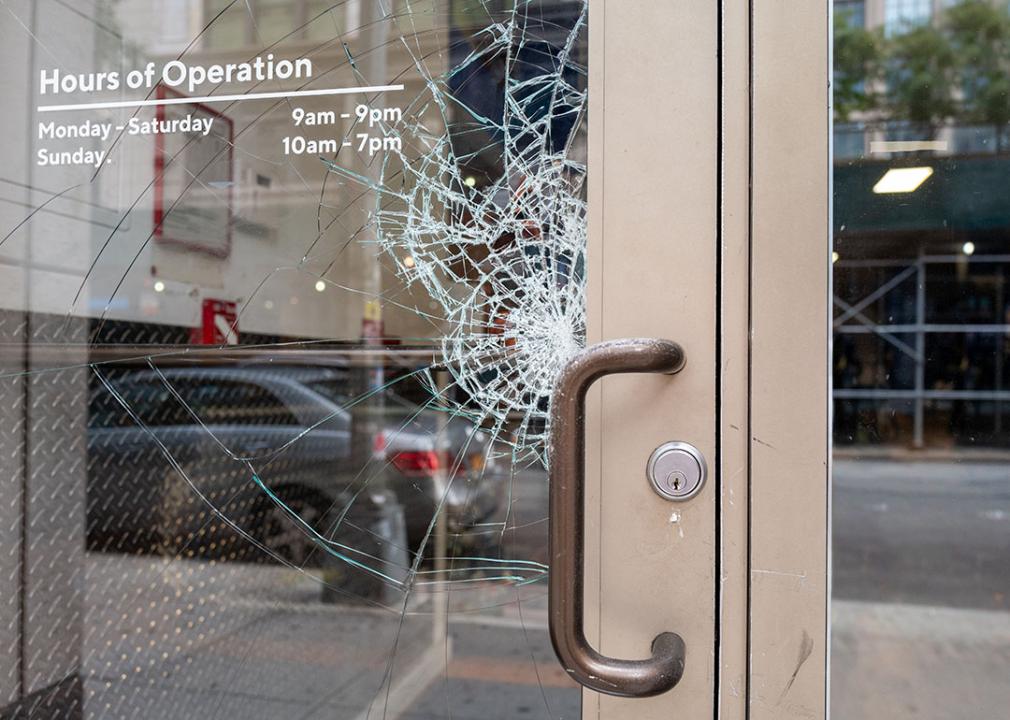Top 4 common commercial insurance claims and how to handle them

Kathy images // Shutterstock
Top 4 common commercial insurance claims and how to handle them
A store’s glass door is cracking from damage.
Many small businesses submit some kind of commercial insurance claim within 10 years of operation. If you’re a small business owner growing your business, small business insurance could keep you and your business protected from unfortunate occurrences that may not even be your fault, according to Next Insurance.
4 common commercial insurance claims
Familiarity with the most common business insurance claims can be helpful if you ever need to file a claim on your own. Some of the most common include:
1. Burglary and theft
No matter what kind of business you run, you may be at risk of burglary or theft from a petty criminal, an angry customer or even a disgruntled employee. Out of all business insurance claims examples, burglary is the most common. Many commercial insurance claims are related to burglary and theft.
2. Fire
Small business owners tend to underestimate the likelihood of a fire. There are many common fire causes, some of which they don’t realize until it’s too late.
They often don’t recognize how much time and money it takes to get their business cleaned up and running again after a fire. The fire department and police need time to complete investigations. Insurance companies also will investigate your property claims. Repairs need to happen. All of these things take time.
Fires are capable of causing a substantial amount of property damage in a short period, potentially devastating a small business that doesn’t have insurance coverage.
3. Weather damage
Anything from wind and hail to snow and ice to cold weather freezing pipes can create problems for a business. About half of all restaurant owners alone report that weather damage has shut down their business for some period of time. If there’s a weather-related natural disaster, it can shut down a business for a while.
Some businesses that close because of a natural disaster never re-open, partly because they don’t have an insurance provider that can help cover the loss.
4. Customer injury
Suppose a customer slips and falls while on your business property. You may be vulnerable to a lawsuit and damage claims. If people frequently visit your business, you may want to consider general liability insurance. This will allow you to submit a general liability accident insurance claim if someone gets hurt on your property.
How the commercial insurance claims process works
In the event your business is affected by one of these issues, the business insurance claims process is usually straightforward.
The first thing you’ll want to do is contact your insurance provider. You should inform them of the situation as soon as possible.
You will want to tell them about anything that was damaged or share every detail of the complaint made by a customer. Some insurance companies will require you to call to report a claim and there are some that allow you to file a claim online.
When you make a liability claim, your insurer will investigate the claim to confirm what happened. Your broker will then look over your insurance policy to see what may be covered and what may not be covered. Your insurer may also recommend contractors who can help you make repairs.
Once the investigation is complete and your policy has been examined, your claims adjuster will let you know the result of your commercial insurance claim.
My insurance claim got denied — now what?
Not every commercial insurance claims process is simple. Your claim can be denied for several reasons, including:
- The insurance company suspects fraud.
- Your policy doesn’t cover the claim.
- You didn’t file the claim in time.
If you have a claim denied, you can write a response letter to your insurance provider that explains why you believe they were wrong to deny the claim. Keep accurate records of anything relevant both before and after the incident. And if you need help, contact a state insurance regulator to guide you through the process.
Also, it never hurts to follow up with an insurance company about a pending claim or to get a clear explanation for why the claim was denied.
You can also take your dispute with an insurance company to small claims court, but hiring a lawyer will be at your own expense, there’s no assurance that you’ll win the case.
Consider working out a deal with the insurance company, even if you have to bring in a state insurance regulator. For a small business, going to court is usually a last resort.
![]()
This story was produced by Next Insurance and reviewed and distributed by Stacker Media.
